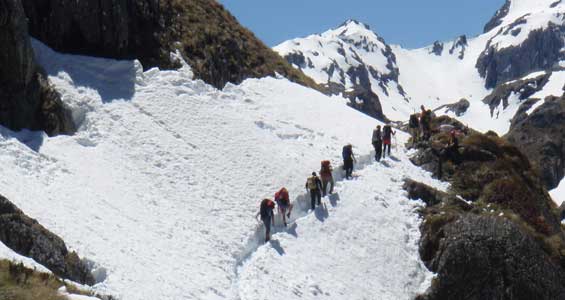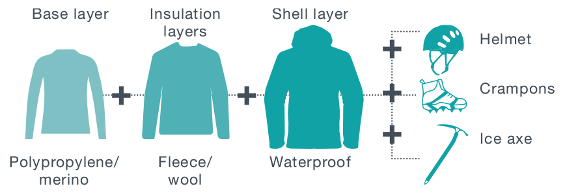Outside the Great Walks season (1 May 2024 – 28 October 2024)
- It can be cold and wet, with ice, snow and short daylight hours.
- Avalanche-prone bridges across some major watercourses are removed.
- DOC does not manage hazards such as flooding and avalanches.
- Facilities are greatly reduced.
Walking the track at this time should only be attempted if you are fit, experienced and well equipped.
Routeburn Track winter tramping safety information (PDF, 673K)
Fees and bookings
Outside of the Great Walks season, hut fees are reduced and bookings are not required. Full information can be found in the fees and booking section for this track.
Expect challenging conditions
Bridges between Lake Mackenzie and Harris Saddle may be removed over winter to avoid damage from avalanches, so you must be competent at crossing swift, icy side streams.
Snow and ice conditions on the Hollyford face and at the Harris Saddle can be extremely dangerous. View current conditions on the Harris Saddle webcam.
Lake Mackenzie is not safe to walk on when frozen.

Climbing up to Harris Saddle in spring
Image: DOC
Conditions will be wet and cold with snow
During the winter months Fiordland can be very wet and cold. Daylight is limited and the high mountains let little sunlight into the valleys. Alpine areas are usually covered in snow. Dress for these conditions.

Avalanches will be frequent
The Routeburn Track has a lot of challenging and complex avalanche terrain. Avalanches are frequent. There are over 32 avalanche paths, some of which may bring avalanche debris to the valley floor and have the potential to cross the Routeburn Track.
If you are going into places avalanches could occur, be sure you:
- have checked the New Zealand Avalanche Advisory for Fiordland, the Avalanche Terrain Exposure Scale (ATES) for Wakatipu, Wanaka and Central Otago and Avalanche Terrain Exposure Scale (ATES) for Fiordland National Park.
- have the skills for the ATES class you are going into
- have checked what avalanche advisory and alert information is available from the DOC visitor centre nearest the area where you want to go
- take an avalanche transceiver, avalanche probe and a snow shovel. Know how to use these tools.
Maps of avalanche paths: Lake Howden to Lake MacKenzie (JPG, 9,111K) | Lake MacKenzie to Falls Hut (JPG, 9,186K)
Expect reduced hut facilities
- Gas is not provided – you will need to bring your own cooking stove.
- Flush toilets are replaced with pit toilets.
- Running water is turned off inside the huts. Water can be obtained from the outside water tank; if this is frozen, then from the nearest water course or by melting snow.
- No rangers based at the huts.
Expect reduced transport services
All transport must be arranged before starting the track. During winter, transport operators require minimum numbers and do not always operate a daily service. Transport arrangements can be affected by bad weather. You must discuss an alternative option with transport operators before you begin your walk.
Be totally self-sufficient
You need to be totally self-sufficient. In addition to what to take in the Great Walks season, you also need:
- food for at least two extra days
- stove and gas for cooking
- lighter or matches
- alpine equipment: ice axe and crampons
- avalanche equipment: beacon, snow shovel, avalanche probe
- personal locator beacon
- satellite messenger (optional)
Read our Conservation Blog: Hiking the Routeburn Track outside the Great Walks season (May to October)